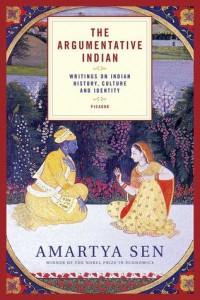Penguin, 2005.
The Argumentative Indian is a great read for those interested in a more critical and deeper look at modern India. Amartya Sen is a Nobel Prize winner in Economics in 1998 and a professor at Harvard. His writing is obviously enlightened, but he writes with a passion for his home country that is directed at important contemporary issues.
The book consists of 16 different essays written by Sen over several years. The essays range in topic from defining and defending Indian secularism, taking a critical look at the Hindutva movement, examining the Indian diaspora, and discussing gender challenges in modern India. After reading this book, you will have a great broad perspective of the most important issues that dominate much of present-day India.
Here are a few key concepts that I got from this book:
- The unique Indian view of defining secularism as being neutral to all religions as opposed to prohibiting religious expressions in the public realm
- A repeated call for outsiders to understand that one’s religion is more about community identity than personal religious beliefs. #IndiasNotIndia
- A celebration of India’s historic rulers, particularly Akbar. Akbar comes up several times in the book, especially for his attempts at treating all religions equally and creating a religiously neutral government.
- The deep historical contributions made by early Indian scientists which were far in advance of their western counterparts (like Aryabhata)
- Sen’s interpretation of the #ThinSkinned Indian as being put down by ignorant English writers and bureaucrats. He says that India was driven to settle on “spirituality” as an area of authority because they were told their achievements in other realms were largely inconsequential. (Sen is a thorough secularist and atheist if you couldn’t guess.)
Sen, who himself is a Bengali, dedicates one essay each to two of West Bengal’s most well-known creators: Rabindranath Tagore and Satyajit Ray. Tagore is perhaps India’s most celebrated poet and the author of the Indian national anthem. Satyajit Ray is a filmmaker whose films still carry a lot of power and influence. Anyone interacting with Bengalis would benefit from these short introductions to two incredible men.
The Argumentative India probably should not be the very first book you read about India, but it is well worth the time. Slightly academic, but very practical, this book will help you dig deeper in your understanding of India.
Who would like it: People with a basic understanding and experience with India.
Buy the Argumentative Indian on Amazon.in, Amazon.com
, or Kindle
